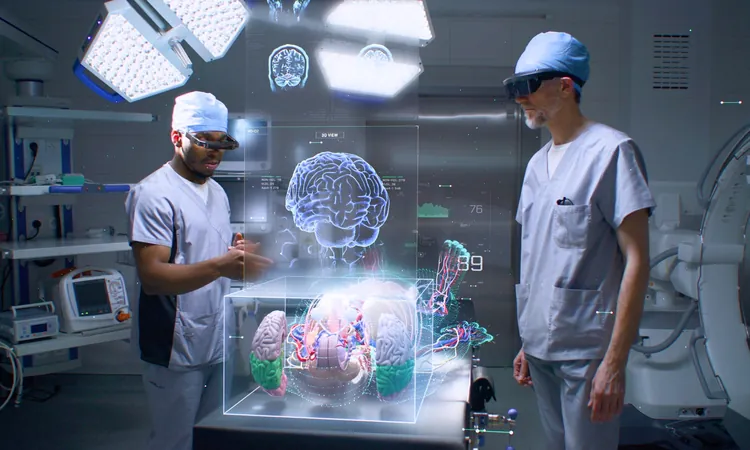
Can Space Agencies Revolutionize Global Healthcare?
2025-03-23
Author: Ming
As health crises continue to mount globally, the strain on healthcare systems is increasingly apparent. From the effects of aging populations to the rise of chronic diseases and infectious outbreaks, the world’s healthcare workers are grappling with unprecedented challenges. In this context, a team of experts is advocating for an unexpected partnership: leveraging the resources and innovative spirit of space agencies to tackle healthcare issues across the globe.
Led by Dr. Farhan Asrar, an associate professor at the University of Toronto, this groundbreaking initiative highlights the value of international collaboration in both space exploration and healthcare. Dr. Asrar emphasizes the potential for shared missions and resources to unite countries in addressing common health challenges.
Innovative Solutions Through Space Collaboration
The International Space Station (ISS) serves as a strong example of international cooperation, where diverse teams from various nations work together, sharing both risks and rewards. This spirit of collaboration could serve as a model for improving global healthcare. As the World Health Organization warns of intensifying health emergencies, greater cooperation among nations is vital for effective responses.
In fact, recent geopolitical turmoil underscores the need for innovative solutions to overcome bureaucratic obstacles that often hinder progress in healthcare. By learning from the collaborative frameworks established in the space sector, healthcare professionals can potentially unlock new efficiencies, reduce costs, and expedite the development and implementation of solutions during crises.
Transformative Impacts of Satellite Technology
Satellites have proven their worth in disaster response, offering real-time data that allows for the swift allocation of medical resources. This technology can track disease outbreaks and identify gaps in healthcare delivery, ensuring that vaccines and treatments reach those most in need. Sharing such vital information mirrors the collaboration seen among space agencies and can lead to breakthroughs that might remain out of reach if nations work in isolation.
Furthermore, the integration of space-based data with local knowledge has the potential to revolutionize public health strategies. This data can provide early warnings of health threats stemming from environmental changes, supporting a proactive rather than reactive approach to health crises.
Collaborative Innovation in Health Solutions
The convergence of the healthcare and space industries could give rise to new opportunities for innovation. Public-private partnerships in space have already made significant advancements, suggesting that similar collaborations in healthcare could foster a more inclusive system of care. By connecting specialists from different regions and facilitating the sharing of best practices, healthcare systems can become more resilient and adaptable to emerging threats.
As climate change exacerbates health issues, the need for a unified approach becomes even more pressing. Space exploration not only pushes the boundaries of science and technology but also fosters international dialogue—an essential component for addressing global health challenges.
A Vision for the Future
This emerging synergy between space and healthcare highlights a transformative potential for enhancing global health outcomes. By prioritizing shared goals over territorial disputes, nations can leverage their collective expertise to tackle pressing health crises effectively.
Incorporating approaches such as the One Health initiative—which recognizes the interconnectedness of human, animal, and environmental health—will be crucial in this endeavor. Bringing together professionals from veterinary science, ecology, and medicine can lead to a holistic approach to public health, enriching our understanding of how best to manage resources and respond to health emergencies.
Final Thoughts
The prospect of collaboration between space agencies and healthcare sectors heralds a new era of innovation and cooperation. Educating future healthcare professionals alongside space scientists could ignite fresh ideas and foster a culture of collaboration that transcends traditional boundaries.
As new technologies and methodologies orbit above us, the implications for healthcare below are profound. Should healthcare professionals embrace lessons from the space community, they might just redefine what is possible in medical care amidst the challenges of our time.
Published in The Journal of the Royal Society of Medicine, this discussion sets the stage for an exciting and potentially game-changing future for global health. Stay tuned as we monitor the unfolding relationship between space exploration and the quest for better healthcare worldwide!

 Brasil (PT)
Brasil (PT)
 Canada (EN)
Canada (EN)
 Chile (ES)
Chile (ES)
 Česko (CS)
Česko (CS)
 대한민국 (KO)
대한민국 (KO)
 España (ES)
España (ES)
 France (FR)
France (FR)
 Hong Kong (EN)
Hong Kong (EN)
 Italia (IT)
Italia (IT)
 日本 (JA)
日本 (JA)
 Magyarország (HU)
Magyarország (HU)
 Norge (NO)
Norge (NO)
 Polska (PL)
Polska (PL)
 Schweiz (DE)
Schweiz (DE)
 Singapore (EN)
Singapore (EN)
 Sverige (SV)
Sverige (SV)
 Suomi (FI)
Suomi (FI)
 Türkiye (TR)
Türkiye (TR)
 الإمارات العربية المتحدة (AR)
الإمارات العربية المتحدة (AR)